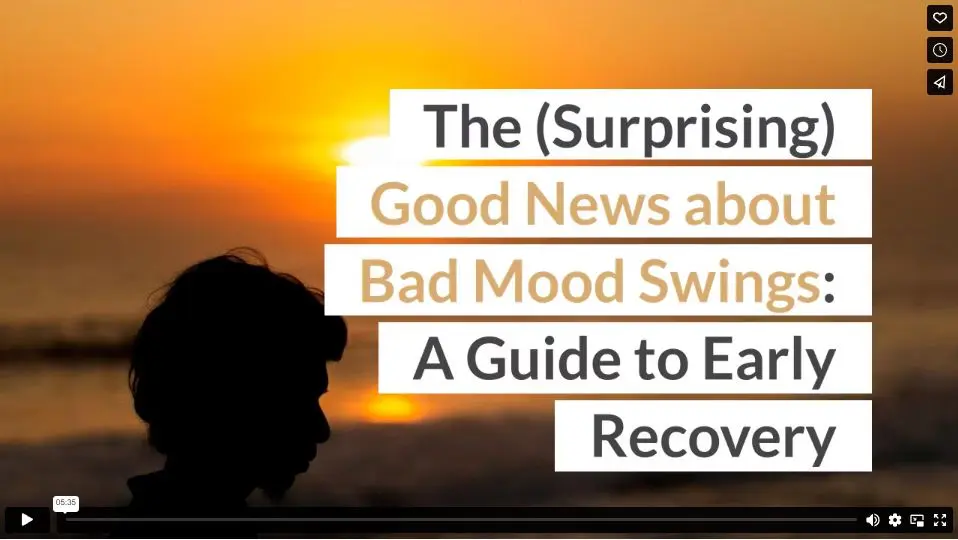You have been clean for a month, and you’re ecstatic. Your recovery group praises you, your addiction counselor uses you as an example for newer clients, and your kid looks at you with new respect in her eyes. You feel like a million bucks as you walk in the door.
Thirty minutes later, you’re watching a TV series and one of the main characters makes a disparaging remark about addiction. Suddenly you feel pathetic and humiliated, angry. What were you thinking, to imagine that you could be an inspiration to anyone? You think to yourself, “Now that I’m in a recovery program, everyone knows what an idiot I am, now more than ever.”

(melancholiaphotography / pixabay)
Sound familiar? Many people in early addiction recovery (first 30-90 days) experience extreme mood swings. A good addiction recovery center will help you prepare for these strong mood shifts, help you understand the root causes, and provide you with tools for coping. Knowing what to expect makes these psycho-social challenges easier to handle.
Psycho-social withdrawal symptoms can be just as disconcerting as physical withdrawal symptoms. The physical changes that accompany early recovery include headaches, fatigue, and the “foggy brain” syndrome. Early recoverers might experience a sudden surge of concentration problems, excessive sweating, and the shakes. Knowing that these symptoms of the detox process are temporary can keep you from becoming discouraged.
Your addiction professional will talk with you about chemical changes in your brain and how the detoxification process will temporarily affect your physical well-being. It will help you stay sober to realize that the shakes, sweats, and user-dreams will subside with time. You will regain your energy, the foggy brain will clear, and your sense of well-being will grow.
Knowing the physical signs of detox can help you know what to expect, but don’t forget that there are emotional and mental signs of detox as well. Radical mood swings are among the most common temporary side-effects of getting sober. Expecting an emotional roller coaster, you can buckle a seat belt, so to speak, and hang on for the ride. It won’t last forever. Just like the physical symptoms of withdrawal, radical mood swings will fade as your body adjusts to the new normal.
Here’s the good news about mood swings in early addiction recovery:
- Mood swings are a sign of detox
- Mood swings are more extreme in early recovery than later recovery
- Mood swings are a sign that your emotions are showing up. Your addiction is not masking your strong feelings anymore.
- Mood swings are a chance to become more mature
It’s okay to have mood swings; it’s not okay to let your mood swings sit down in the driver’s seat of your bus, so to speak. You are the driver of the bus. Your moods are the rowdy kids in the bus, sometimes quiet, but sometimes standing up and shouting and harassing. As the driver of the bus, notice what’s happening, but don’t give up your driver’s seat.
Just because you feel angry or mean doesn’t mean you have to act angry or mean. Recovery is an amazing process, a rebirth, and your loved ones want to support you. Recovery is not a free-pass to emotionally or physically abuse the people around you.
When you swing from giddy to weeping and back again, all in an afternoon, it’s a good sign. It’s a classic sign of withdrawal. Extreme mood swings are part of the journey; they mean that a new person is emerging. Severe mood swings are more tolerable when you realize that they are like birthing pains: a necessary and normal process that leads to something new. The struggle won’t be as sharp as you move further into the recovery process.
According to clients, family members, and addiction professionals, mood swings are most extreme in early recovery. They are a sign that your emotions are showing up and (thankfully) not being masked by harmful substances or behaviors. In the past, you might have smothered some of these strong feelings, but now you have the support and determination to feel what there is to feel. Feel frustration, feel triumph, feel regret, feel inspired, feel stupid, feel brilliant, feel like a jerk, feel like a winner.
Feelings, both pleasant and unpleasant, come and go. Recovery support will help keep you steady as you open yourself up again to a wide range of human feelings. Making peace with the human condition is the work of a lifetime, but it can feel like a wild ride in the early days of recovery.
Some theorists believe that emotional maturation stops when you start using. If you started using as a teenager, for example, your physical age might be 35 but your emotional age might be 18. Your emotional ups-and-downs, your reactiveness, your underlying insecurity might be much closer to a teenager’s if that’s when you started using. You might be in your 20s, 30s, 40s, 50s, 60s, 70s, or beyond, your body aging with the years, but your emotional age was frozen in time. It will take time to emotionally mature, but it’s possible. This is the journey of recovery.
The journey of recovery is working through the developmental stages in a compressed time period. Your addictive substance or behavior was the way that you previously coped with strong feelings and emotions. Now that you are avoiding that substance or behavior, you are learning to work through problems naturally. It’s challenging but possible. Your addiction professional will guide you in gathering effective strategies for coping with life’s inevitable ups and downs.
The good news about extreme mood swings? Unless they are so extreme that they interfere with your functioning, they are a normal part of recovery. In fact, extreme mood swings can be taken as a sign that the recovery process is well underway. Congratulations!
Video

